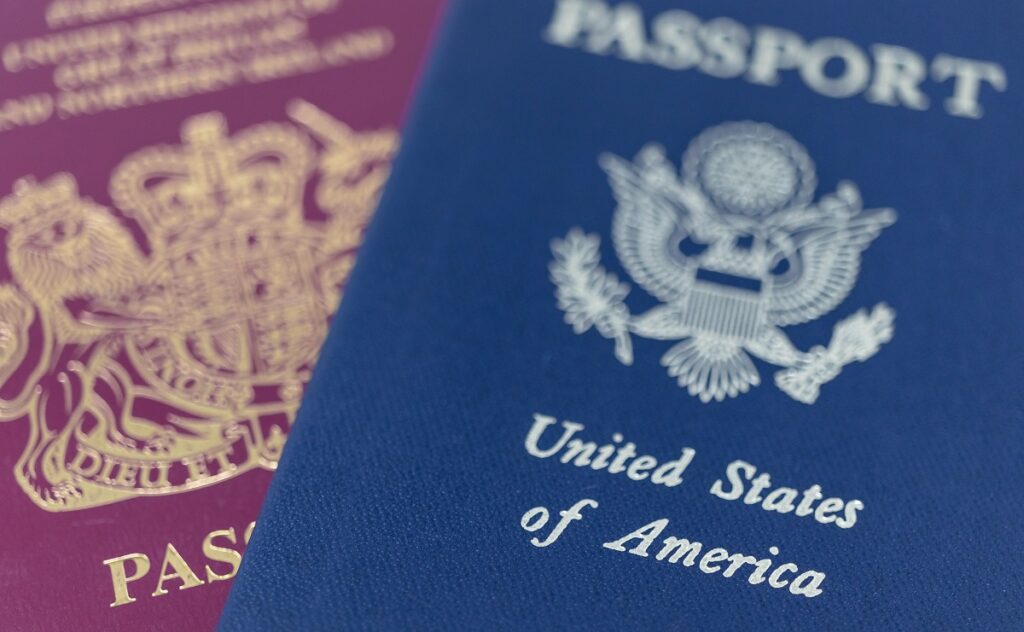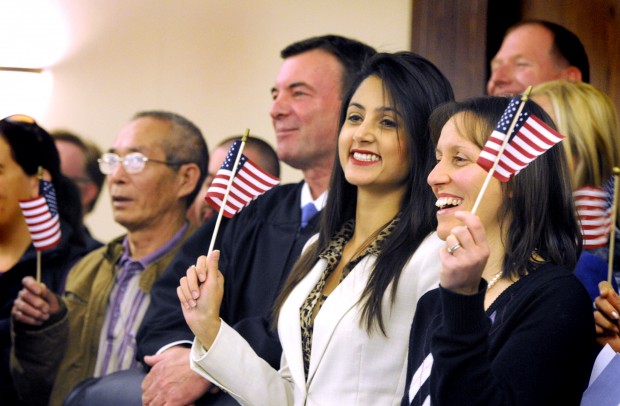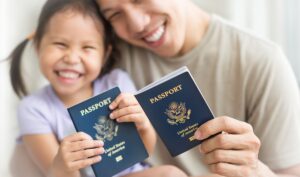As far as America is concerned, you can have dual citizenship in the U.S.

Dual citizenship involves holding the status of a citizen in two countries. For example, a British citizen who later becomes a U.S. citizen. Dual citizens hold full rights to both countries: they can vote, live, work, and enjoy two safety nets.
For many immigrants, becoming an American citizen is the light at the end of the tunnel. Citizenship means the end of the immigration journey. If you’re not born in the United States, the only other way to become an American citizen is to naturalize.
When you’re a citizen of any country, you have the highest level of rights and responsibilities: you may vote, run for office, buy property, live and work in the territory indefinitely. When you have dual citizenship, all of those rights and responsibilities are yours – in two different countries.
Applications for naturalization tend to see spikes in election years, and due to the high stakes of the 2020 election, this year has not been the exception. For a long time, public opinion in the U.S. was against dual citizenship. In fact, people campaigned against it. People U.S.ed to believe that dual citizens were less loyal to the U.S. than those who were only U.S. citizens. The bottom line is, dual citizenship is not prohibited anywhere in U.S. law. The Supreme Court has also ruled in favor of dual citizenship more than once.
Confusion about Dual Citizenship
So why, if Americans can have dual citizenship, does this seem to be a question people still have? Why are people confused about whether U.S. citizens can be citizens in two or more countries?
There are three important reasons why people are still confused about dual citizenship in the U.S.:
1. It’s not mentioned in the Constitution.
The 14th Amendment in the United States Constitution says, “All persons born or naturalized in the United States, and subject to the jurisdiction thereof, are citizens of the United States and of the state wherein they reside.”
This is the only part of the Constitution that talks about citizenship. Dual citizenship is not regulated in the Constitution of the United States, but Americans are more interested than ever in getting a second passport.
When the Constitution doesn’t address something, it’s left to Congress to make laws. If there are no laws, we check what the Supreme Court has said about it. The Supreme Court has ruled more than once that Americans can be dual citizens.
There are two important Supreme Court decisions on dual citizenship:
- In Afroyim v. Rusk, the Supreme Court decided that only an American citizen can let go of its own citizenship. The government cannot cancel anyone’s citizenship – doing so violates the 5th Amendment and contradicts what the 14th amendment says about who is considered a United States citizen: “all persons born or naturalized”.
- In Vance v. Terrazas, the Court decided that having another citizenship while you are a U.S. citizen doesn’t imply you’re giving up your U.S. citizenship.
As far as U.S. law goes, you’re American first, even if it’s your second citizenship. Other countries may demand that you give up your American citizenship, but the U.S. has no say in that.
2. It’s not mentioned in the Immigration and Nationality Act.
The Immigration and Nationality Act is U.S. law. It can’t dictate other countries’ requirements for citizenship, and it doesn’t forbid Americans from becoming dual citizens. According to the U.S. State Department, “U.S. law does not mention dual nationality or require a person to choose one nationality or another. A U.S. citizen may naturalize in a foreign state without any risk to his or her U.S. citizenship.”
By U.S. law, dual citizens are required to follow the laws of both countries of citizenship.
3. The Oath of Allegiance’s language
Permanent residents take an Oath of Allegiance in the final stages of naturalization. The Oath of Allegiance has pretty strong language about what it means to become an American:
“I hereby declare, on oath, that I absolutely and entirely renounce and abjure all allegiance and fidelity to any foreign prince, potentate, state, or sovereignty, of whom or which I have heretofore been a subject or citizen…”
Some people who are thinking about applying for U.S. citizenship get nervous. They are afraid of what saying this could mean. Because it talks about renouncing, it makes people think they’re renouncing their citizenship.
But never fear. The interpretation of the Oath of Allegiance that is generally accepted in case law indicates that “it’s the thought that counts.” No U.S. official will ask you to give up your other citizenship.
Your Due Diligence Before Applying for U.S. Citizenship
The very first thing you need to do before you apply for U.S. citizenship is check the rules of your own country. Are you eligible for dual citizenship? These rules are different in every country. Talk to the embassy or consulate of your country of citizenship to learn about the current rules. There are a couple of possible scenarios that could apply to you depending on your country of origin:
- Best case scenario: Your country allows dual citizenship. When you become a U.S. citizen, you will be a citizen of both. You can check countries that allow dual citizenship. But remember, the best place to confirm this is your country’s embassy or consulate.
- Hiccup: you can become a U.S. citizen, but that cancels your previous citizenship. Your country may have a process to reclaim it or retain it. The Philippines is a notable example.
- Worst case scenario: your country does not allow dual citizenship, in which case, if you want to become a citizen of the U.S., you lose your citizenship. China, India, and Singapore are some examples. Facebook co-founder Eduardo Saverin, a U.S. citizen, renounced his U.S. citizenship when he became a Singaporean citizen, to mention an example.
Many Immigrants Favor Dual Citizenship
Indians in the U.S. overwhelmingly support dual citizenship and have been trying to influence legislation back home without luck. In 2010, 21 African countries prohibited dual citizenship. Pressure from the diaspora could lead to changes in local legislation.
Some countries don’t allow dual citizenship but are not great about enforcing it and don’t prosecute those who take dual citizenship. However, that doesn’t mean that you’re off the hook. You may end up losing one of your citizenships in the end.
Before applying for naturalization in the U.S., make sure that you understand the rules. Contact your country’s nearest embassy or consulate. Be prepared for confusing answers. Keep digging, but remember that rules on dual citizenship change. For example, Norway started allowing dual citizenship this year.
What’s so Great about Dual Citizenship?
Greater Freedom of Movement
 Having U.S. citizenship opens a lot of doors. Before COVID-induced travel restrictions went into place, the United States passport was one of the most powerful in the world. It allowed visa-free or visa on arrival entrance to 185 countries. Experts predict that the current travel restrictions for U.S. citizens will likely end when the pandemic gets better. So even if there are restrictions in place right now, it’s unlikely that those will reduce the worth of a United States passport in the long run.
Having U.S. citizenship opens a lot of doors. Before COVID-induced travel restrictions went into place, the United States passport was one of the most powerful in the world. It allowed visa-free or visa on arrival entrance to 185 countries. Experts predict that the current travel restrictions for U.S. citizens will likely end when the pandemic gets better. So even if there are restrictions in place right now, it’s unlikely that those will reduce the worth of a United States passport in the long run.
United States Citizenship and Immigration Services (USCIS) announced fee increases starting in October 2020 for most of its applications, including the application for naturalization. If you’re eligible, you can beat the fee increase by filing before October 2, 2020. CitizenPath provides an affordable service to help you prepare USCIS forms like Form N-400, Application for Naturalization. We even guarantee USCIS approval. Learn how with our step-by-step service.
Remember that U.S. citizens must leave and enter the country with their U.S. passport. So make sure you take it with you when you travel. You can learn more about applying for a U.S. passport on the Department of State’s website.
Expanded Benefits
Being a dual citizen gives you the right to live and work in both countries. You can also tap into both countries’ social services and apply for assistance if you need it. You also have more educational opportunities. As a dual citizen, you are also able to own property in both countries.
A Voice in Two Places
As a dual citizen, you also have the right to vote in both places. In the United States, you also have the responsibility to report for jury duty. You can influence issues that are important to you and may shape public opinion for years to come. Your vote matters on issues ranging from immigration to healthcare to the president.
RECOMMENDED: 3 Practical Benefits of U.S. Citizenship That Shouldn’t Be Overlooked
Dual Citizens May Have Additional Responsibilities
Each dual citizen has to follow the law in both their countries of citizenship. For example, U.S. citizens need to report for jury duty if they ask. You can get in trouble for not showing up for jury duty unless you communicate a good reason not to. U.S. citizens also have to file taxes each year. United States citizens have to report their worldwide income. Failing to do so could also result in penalties.
Make sure you understand the financial and tax implications of being a dual citizen. Talk to a professional with experience in international taxation.
Would the United States ever ask me to give up my other citizenship?
The United States is not responsible for other countries’ rules on citizenship. Each person has to make sure the rules that apply to them don’t contradict each other. The U.S. allows dual citizenship, but other countries don’t. It is up to each individual to decide which citizenship to keep in case of a conflict.
Bear in mind, that renouncing your U.S. citizenship is irreversible. If you give it up, you cannot recoup your American citizenship by any means. If you perform military service for a country in conflict with the United States, you could lose your American citizenship. In fact, you run the risk of surrendering your American citizenship if you:
- Run for public office in a foreign country (under certain conditions)
- Enter military service in a foreign country (under certain conditions)
- Apply for citizenship in a foreign country with the intention of giving up U.S. citizenship
- Commit an act of treason against the United States
Does the U.S. care if people are dual citizens of other countries?
Not really. The U.S. doesn’t encourage or discourage dual citizenship. Each person can choose for themselves. Isn’t that kind of freedom the promise many seek in America? In the eyes of the U.S., you are first an American citizen, even if you are a dual citizen.
Applying for Citizenship in the U.S.
Non-citizens may apply for naturalization once they meet the citizenship requirements. In most cases, individuals are eligible after five years as a permanent resident. Use Form N-400, Application for Naturalization, to apply. There are no special forms or instructions for applicants that already have citizenship in another country.
Ready to start? CitizenPath’s service was designed by immigration attorneys to give you an affordable, reliable way to prepare the application. You’ll have the ability to prepare Form N-400 from the comfort of your own home knowing that you did everything right. To learn more about pricing and the 100% money-back guarantee, view our naturalization package.
RECOMMENDED: Proving Your Child’s U.S. Citizenship after Naturalization
Want more immigration tips and how-to information for your family?
Sign up for CitizenPath’s FREE immigration newsletter and
SAVE 10%
on our immigration services



